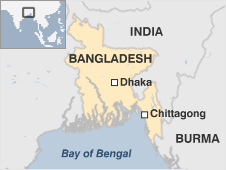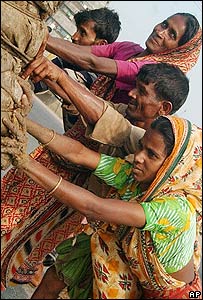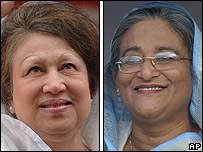Generic Medicines
Taj Pharma is the largest generic pharmaceutical company in India. We hold top positions in different established markets worldwide generics markets..
Bangladesh is one of the world's most densely populated countries with its people crammed into a delta of rivers that empties into the Bay of Bengal.
 |
Poverty is deep and widespread; almost half of the population live on less than one dollar a day. However Bangladesh has reduced population growth and improved health and education.
The major employer is agriculture but it is unable to meet the demand for jobs. Thus many Bangladeshis - in common with citizens from other countries in the region - seek work abroad sometimes illegally. The country is trying to diversify its economy with industrial development a priority. Overseas investors have pumped money into manufacturing and the energy sector.

Bangladesh is one of the most densely populated countries
|
Onshore and offshore gas reserves hold out some chance of future prosperity. There has been a debate about whether the reserves should be kept for domestic use or exported. Some international energy companies are involved in the gas sector.
Formerly East Pakistan Bangladesh came into being only in 1971 when the two parts of Pakistan split after a bitter civil war which drew in neighbouring India.
Bangladesh spent 15 years under military rule and although democracy was restored in 1990 the political scene remains volatile.
Analysts say the antagonism between the Awami League which governed until July 2001 and the Bangladesh Nationalist Party reflects personal animosity between their leaders rather than substantial ideological differences.
Political tensions have spilled over into violence; hundreds of people have been killed in recent years. Attacks have targeted opposition rallies and public gatherings. Senior opposition figures have also been targeted.
Concern has grown about religious extremism in the traditionally moderate and tolerant country which found apparent form in a string of bomb attacks in August 2005. The government which long denied that it had a problem with militants has outlawed two fringe Islamic organisations.
Bangladesh has been criticised for its human rights record with particular concern about assaults on women and allegations that police use torture against those in custody.
The low-lying country is vulnerable to flooding and cyclones and it stands to be badly affected by predicted rises in sea levels.
President: Zillur Rahman
Prime minister: Sheikh Hasina Wajed
Sheikh Hasina became Bangladesh's prime minister for the second time in January 2009.
In general elections in December 2008 her centre-left Awami League won a crushing victory over the centre-right Bangladesh Nationalist Party (BNP) led by her long-time political foe Begum Khaleda Zia.
The Awami League-led alliance won more than 250 seats in the 300-seat parliament.

Begum Khaleda Zia (left) and Sheikh Hasina
|
Sheikh Hasina and Khaleda Zia - both former prime ministers - had been jailed for suspected corruption but were released to contest the vote.
The election marked a return to the usual two-party politics after the state of emergency imposed in January 2007 despite the army-backed caretaker government's attempts to break the mould and encourage a third political force.
Only a few months after her election the new prime minister faced a serious crisis when hundreds hundreds of border guards mutinied in Dhaka. The mutineers killed 74 people mainly army officers before the government succeeded in suppressing the rebellion.
Rivalry
Politics in Bangladesh has long been dominated by the bitter rivalry between the two women.
Hasina was previously prime minister from 1996 to 2001 while Khaleda was in power between 1991 and 1996 and again from 2001 to October 2006 when she handed over power to a caretaker administration ahead of elections.
The hostility between the women stems in part from differences over who played a greater role in the country's independence struggle - Hasina's father Sheikh Mujibur Rahman or Khaleda's husband General Ziaur Rahman.
After independence from Pakistan in 1971 Mujib was named father of the nation in the country's 1972 constitution.
But when Khaleda assumed power in 1991 her party pushed the idea that her husband was an equally key player in the independence struggle.
Khaleda's government amended the constitution in 2004 to delete the reference that Mujib was the father of the nation.
In 2009 six months after an election victory by Sheikh Hasina the High Court ruled that Mujib should be considered the man who proclaimed independence.
Khaleda and Hasina sank their differences when military ruler Hossain Mohammad Ershad was in power from 1982 to 1990. The two cooperated in the movement to oust Ershad.
But their alliance ended with Ershad's departure and they have been uncompromising rivals ever since on a range of issues.
Hasina accuses Khaleda's BNP and its Islamic allies with links to outlawed Islamist groups blamed for a series of bomb attacks in 2007. Khaleda says Hasina's statements amounted to treason.
Hasina escaped an assassination attempt in August 2004 when grenades exploded at a rally she was addressing. Twenty-three people were killed in the attack which the Awami League said could be linked to parties in the ruling coalition.
The main broadcasters - Radio Bangladesh and Bangladesh Television (BTV) - are state-owned and government-friendly. There is little coverage of the political opposition except in the run-up to general elections when a caretaker government takes control.
TV is the most-popular medium especially in cities. BTV is the sole terrestrial TV channel. Popular satellite and cable channels include ATN Channel i NTV RTV Channel One BanglaVision and Boishakhi.
Foreign especially Indian TV stations have large audiences in Dhaka and other cities.
State-run radio covers almost the entire country. BBC World Service programmes in English and Bengali are broadcast on 100 MHz FM in Dhaka.
Newspapers are diverse outspoken and privately-owned. English-language titles appeal mainly to an educated urban readership.
The constitution guarantees press freedom but journalists are prone to harassment from the police and political activists. The government exercises some influence through the placement of official advertising.
Media rights organisation Reporters Without Borders has accused the army of targeting journalists who it says face arrest maltreatment and censorship.
There were 500,000 internet users in Bangladesh by March 2008 - 0.3% of the population (ITU figure).
The press
Television
Radio
News agencies/internet
bdnews24 - private
AFRICA | ASIA-PACIFIC | AMERICAS | EUROPE | MIDDLEEAST | SOUTHASIA
![]()
![]()
![]()
Mauritania Mauritius Morocco Mozambique Namibia Niger Nigeria Republic-of-congo Rwanda Sao-tome-and-principe Senegal Seychelles Sierra-leone Somalia South-africa Sudan Swaziland Tanzania The-gambia Togo Tunisia Uganda Australia Brunei Burma Cambodia China East-timor Fiji Indonesia Japan Kazakhstan Kiribati Kyrgyzstan Laos Malaysia Marshall-islands Micronesia Mongolia Nauru New-zealand North-korea Palau Papua-new-guinea Samoa Singapore Solomon-islands South-korea Taiwan Tajikistan Thailand The-philippines Tonga Turkmenistan Tuvalu Uzbekistan Vanuatu Vietnam Antigua-and-barbuda Belize Bolivia Brazil Canada Chile Colombia Costa-rica Cuba Dominica Dominican-republic Ecuador El-salvador Grenada Guatemala Guyana Haiti Honduras Jamaica Mexico Nicaragua St-kitts-and-nevis St-lucia Suriname Trinidad-and-tobago Uruguay Venezuela Albania Andorra Armenia Austria Azerbaijan Belarus Belgium Bosnia-hercegovina Bulgaria Croatia Cyprus Czech-republic Denmark Estonia Finland France Georgia Germany Greece Hungary Iceland Ireland Italy Latvia Liechtenstein Lithuania Luxembourg Macedonia Malta Moldova Monaco Montenegro Norway Poland Portugal Russia San-marino Serbia Slovakia Slovenia Spain Sweden Algeria Egypt Iran Iraq Israel-and-palestinian-territories Jordan Kuwait Lebanon Libya Mauritania Oman Saudi-arabia Sudan Syria Tunisia United-arab-emirates Yemen Afghanistan Bangladesh Bhutan India Nepal Pakistan Sri-Lanka The-Maldive